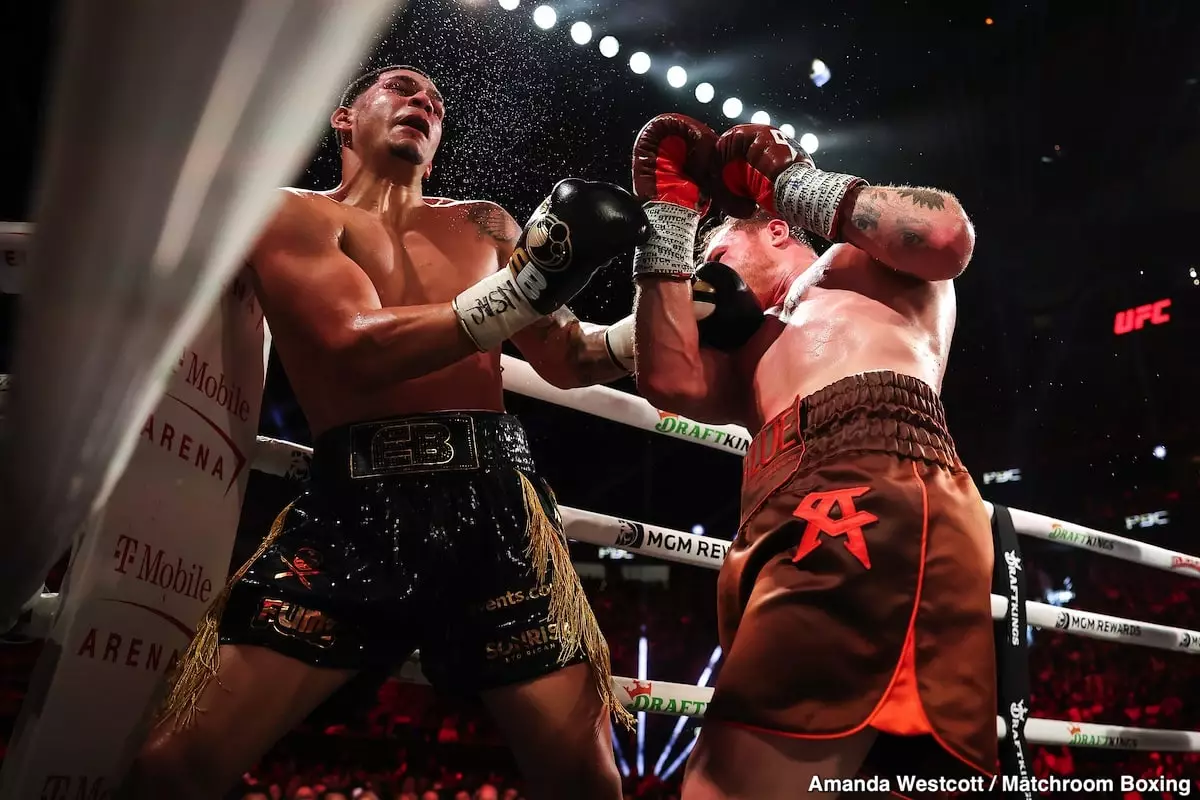BY BOXING HIT STAFF-
In the world of boxing, ambition is often the catalyst for greatness. Edgar Berlanga, known for his assertive fighting style in the super-middleweight category, has taken a bold leap by calling out former heavyweight champion Anthony Joshua. Berlanga’s proclamation on social media, stating his desire to “test greatness” by stepping up to heavyweight and face Joshua, has served as a talking point for fans and analysts alike. This challenge, posed with the weight claim of entering the ring at 210 pounds, raises several questions about the feasibility, motivation, and implications behind such an audacious move.
At 6’1″, Berlanga is relatively tall for a 168-pound fighter. However, the transition from super-middleweight to heavyweight is fraught with challenges, given the significant weight and physical advantages heavyweights typically possess. His recent fight with Canelo Alvarez, where he weighed in at a hefty 193 pounds, showcased his ability to carry weight effectively, but moving up another 17 pounds to face Joshua is a different ballgame altogether. Berlanga’s performance against Canelo was commendable, demonstrating resilience and the potential to expand his career trajectory. Nevertheless, it is essential to consider whether his abilities can translate into success against a multiple-title holder like Joshua.
Skepticism naturally follows when discussing the potential of Berlanga stepping into the ring with Joshua. While Berlanga’s enthusiasm is admirable, it is crucial to analyze what a matchup like this would entail for both fighters. Joshua’s recent defeat to Daniel Dubois has raised questions about his current form and status in the boxing hierarchy. Indeed, Berlanga’s callout could be seen as a strategic move to further his visibility in a sport where promotions often hinge on name recognition. However, what does Berlanga truly stand to gain from such a fight?
For Joshua, if he were to accept this bout and secure a win, it may be perceived as a hollow victory given the significant weight class disparity. Conversely, a loss would be catastrophic, igniting discussions about his preparedness and future in the sport. The stakes are consequently high, perhaps too high, to consider this match anything more than fanciful speculation.
Berlanga is not alone in expressing interest to box above their weight class. Notably, retired boxer Andre Ward once stated he believed he could beat Joshua, showcasing that this sentiment has emerged before. It highlights a pattern among smaller fighters, who sometimes evoke the allure of facing larger opponents, primarily as an avenue for visibility and legacy building. Berlanga’s boldness may echo the ambitions of fighters before him, but the realm of fantasy often collides harshly with reality when physicality and skill differences enter the equation.
Ultimately, Berlanga’s decision to call out Joshua may be less about a feasible fight and more about generating buzz in a competitive adult sport. His future rests on returning to the ring, hopefully securing bouts that capitalize on his skill set and marketability. The potential to transcend weight classes remains a tantalizing allure for aficionados, but practicality suggests he would do better to focus on consolidating his position in the super-middleweight division before dreaming of heavyweight glory.
Berlanga’s challenge to Joshua encapsulates the duality of ambition in boxing; it is at once a bold testament to his confidence and perhaps a misjudgment of the realities inherent in the sport. While he is undoubtedly making headlines, there are more pressing and strategic avenues for his career to explore. As Berlanga looks ahead, moderation and strategic planning may ultimately serve him better than mere bravado, allowing him to optimally navigate the challenging landscape of professional boxing. In the end, while confidence in one’s abilities is crucial, so too is an understanding of one’s place in the sport’s intricate hierarchy.


Leave a Reply